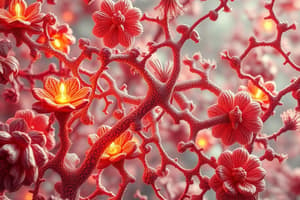Podcast
Questions and Answers
What is the primary function of carbohydrates in cells?
What is the primary function of carbohydrates in cells?
- Serve as energy storage (correct)
- Facilitate cell communication
- Act as enzymes for biochemical reactions
- Provide structural support to cell membranes
Which biomolecule class includes fats, oils, and waxes?
Which biomolecule class includes fats, oils, and waxes?
- Proteins
- Carbohydrates
- Nucleic acids
- Lipids (correct)
What is the focus of biochemistry as a scientific discipline?
What is the focus of biochemistry as a scientific discipline?
- Studying the interactions of living organisms with their environment
- Exploring the interactions of atoms and subatomic particles
- Analyzing the geological processes of the Earth
- Investigating the molecular foundations of living organisms (correct)
Which of the following is NOT a principal class of biomolecules in biochemistry?
Which of the following is NOT a principal class of biomolecules in biochemistry?
What is the main function of lipids in cells?
What is the main function of lipids in cells?
Which term best describes the set of chemical reactions that maintain life in living cells?
Which term best describes the set of chemical reactions that maintain life in living cells?
What is the primary genetic material of living organisms?
What is the primary genetic material of living organisms?
What are enzymes in biochemistry?
What are enzymes in biochemistry?
What do metabolic pathways in biochemistry involve?
What do metabolic pathways in biochemistry involve?
How has biochemistry contributed to medicine and health?
How has biochemistry contributed to medicine and health?
What technique allows scientists to manipulate the genetic material of living organisms?
What technique allows scientists to manipulate the genetic material of living organisms?
What fundamental processes does biochemistry study?
What fundamental processes does biochemistry study?
Flashcards are hidden until you start studying
Study Notes
Exploring the World of Chemistry: A Focus on Biochemistry
Chemistry, the science of matter and its interactions, encompasses a wide range of disciplines. Among these, biochemistry takes a unique and fascinating approach, focusing on the molecular foundations of living organisms. In this article, we'll dive into the core concepts of biochemistry, examining its applications and the discoveries that have led to our understanding of life at the molecular level.
The Fundamentals of Biochemistry
Biochemistry is the study of chemical processes that occur within living organisms. At its core, biochemistry is the study of molecules and their interactions, which are essential to the functioning of cells, tissues, and organisms. Biochemical processes include metabolism, which is the set of chemical reactions that occur within living cells to maintain life, and the synthesis of biological molecules like proteins and nucleic acids.
Biomolecules: The Building Blocks of Life
Biochemistry focuses on four principal classes of biomolecules:
-
Carbohydrates are organic compounds that serve as the primary source of energy for cells and as structural components of cells and tissues.
-
Lipids are a diverse group of molecules that include fats, oils, and waxes. They provide energy storage and serve as structural components of cell membranes.
-
Proteins are large, complex molecules composed of amino acids that serve many functions in living organisms, such as catalyzing chemical reactions, providing structural support, and serving as signaling molecules.
-
Nucleic acids are the primary genetic material of living organisms. They store and transmit genetic information in the form of DNA and RNA.
Enzymes and Metabolic Pathways
Biochemistry studies the role of enzymes in metabolic pathways, chemical reactions that occur within cells. Enzymes are biological catalysts that speed up the rate of chemical reactions without being consumed in the process. They serve as the molecular machinery that drives metabolism and maintains life.
Metabolic pathways are a series of interconnected chemical reactions that lead to the formation of a specific product. Biochemistry investigates the enzymes and metabolic pathways that underlie life's fundamental processes, such as respiration, photosynthesis, and the synthesis of biological molecules.
Biochemistry in Medicine and Health
Biochemistry has revolutionized medicine and the study of human health. Understanding the molecular basis of disease has led to the development of new diagnostic tools and treatments. Biochemical methods are used to identify and characterize disease-causing genes, develop new drugs, and study the molecular mechanisms underlying disease progression and treatment.
Additionally, biochemistry has led to the development of genetic engineering techniques, such as recombinant DNA technology, that allow scientists to manipulate the genetic material of living organisms in unprecedented ways. These advancements have opened the door to applications such as gene therapy and the production of genetically modified organisms for agriculture and industrial purposes.
Conclusion
Biochemistry is a fascinating field that explores the chemical processes that underlie life's fundamental functions. With its focus on the molecular foundations of living organisms, biochemistry contributes to our understanding of the world around us and has revolutionized the fields of medicine, agriculture, and industry. As we continue to unravel the mysteries of life at the molecular level, biochemistry promises to provide new insights and solutions to the challenges that lie ahead.
Studying That Suits You
Use AI to generate personalized quizzes and flashcards to suit your learning preferences.



